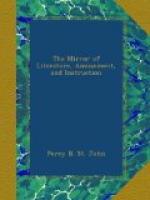“In an insurrection of the people in the Piazza Navona, arising from a quarrel, which began at a bull-fight, Stefano Porcari endeavoured to direct their attention to a more noble object, and turn this tumult to the advantage of liberty. The pope hastily indulged all the fancies of the people, with respect to their games or amusements; but firmly rejected all their serious demands, and exiled Porcari to Bologna. The latter hoped to obtain by conspiracy what he had failed to accomplish by insurrection. There were not less than 400 exiled Roman citizens: he persuaded them all to join him, and appointed them a rendezvous at Rome, for the 5th of January, 1453, in the house of his brother-in-law. Having escaped the vigilance of the legate of Bologna, he proceeded there himself, accompanied by 300 soldiers, whom he had enlisted in his service. The whole band was assembled on the night of the appointed 5th of January; and Stefano Porcari was haranguing them, to prepare them for the attack of the capitol,—in which he reckoned on re-establishing the senate of the Roman republic,—when, his secret having been betrayed, the house was surrounded with troops, the doors suddenly forced, and the conspirators overcome by numbers before their arms had been distributed. Next morning, the body of Stefano Porcari, with those of nine of his associates, were seen hanging from the battlements of the castle of St. Angelo. In spite of their ardent entreaties, they had been denied confession and the sacrament. Eight days later, the executions, after a mockery of law proceedings, were renewed, and continued in great numbers. The pope succeeded in causing those who had taken refuge in neighbouring states to be delivered up to him; and thus the last spark of Roman liberty was extinguished in blood.”
General Mildness of Italian Warfare.
“1492. The horses and armour of the Italian men at arms were reckoned superior to those of the transalpine nations against which they had measured themselves in France, during “the war of the public weal.” The Italian captains had made war a science, every branch of which they thoroughly knew. It was never suspected for a moment that the soldier should be wanting in courage: but the general mildness of manners, and the progress of civilization, had accustomed the Italians to make war with sentiments of honour and humanity towards the vanquished. Ever ready to give quarter, they did not strike a fallen enemy. Often, after having taken from him his horse and armour, they set him free; at least, they never demanded a ransom so enormous as to ruin him. Horsemen who went to battle clad in steel, were rarely killed or wounded, so long as they kept their saddles. Once unhorsed, they surrendered. The battle, therefore, never became murderous. The courage of the Italian soldiers, which had accommodated itself to this milder warfare, suddenly gave way before the new dangers and ferocity of barbarian enemies. They became terror-struck when they perceived that the French caused dismounted horsemen to be put to death by their valets, or made prisoners only to extort from them, under the name of ransom, all they possessed. The Italian cavalry, equal in courage, and superior in military science, to the French, was for some time unable to make head against an enemy whose ferocity disturbed their imaginations.”




